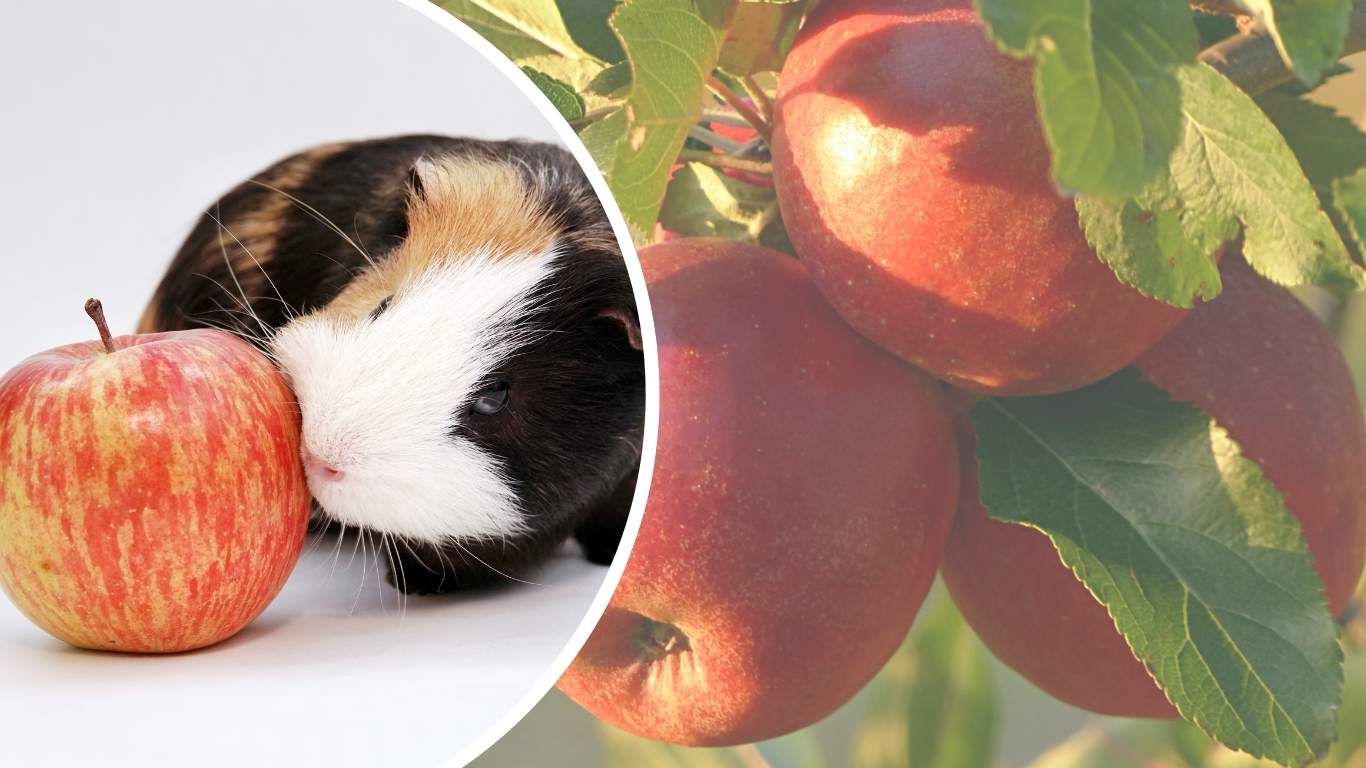Can Guinea Pigs Eat Apples? The Surprising Truth Every Owner Must Know! 🍏🐹
Yes, guinea pigs can eat apples—but only in moderation! Discover the safe portions, hidden dangers of seeds, and the best apple types for your furry friend. Avoid common feeding mistakes and keep your piggy healthy, happy, and thriving with this must-read guide! 🚨🍎✨
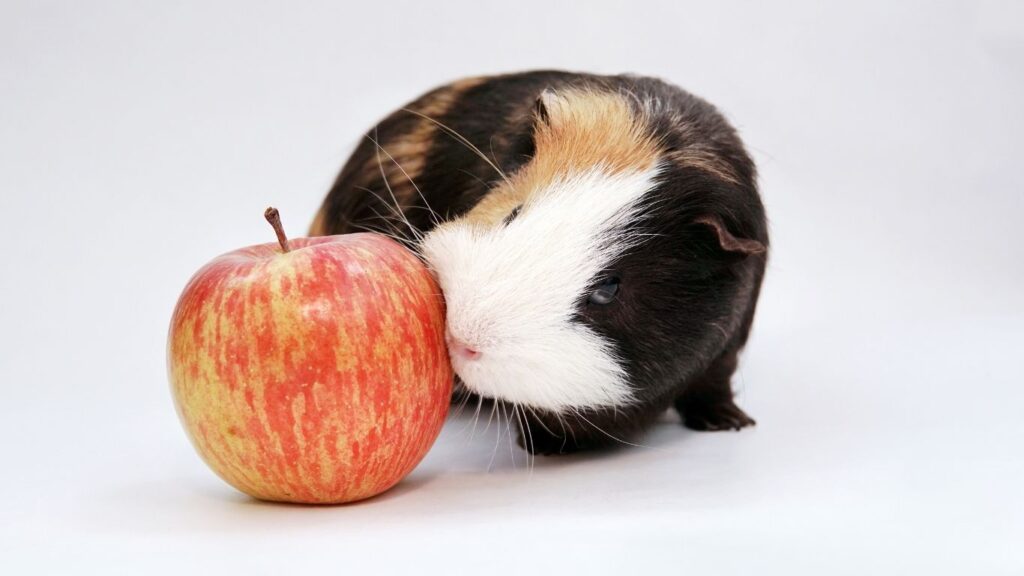
Can Guinea Pigs Eat Apples?
Guinea pigs love fresh fruits like apples, but not all types are safe for your furry friend. Since they are herbivores, their diet should be balanced with vegetables, hay, and grasses. Apples are allowed as healthy treats, but due to their sugary content, they should be given in moderation to avoid health issues.
For proper care and feeding, always remove the seeds and cut apples into small pieces. They provide vitamin C, which supports a fiber-rich diet alongside leafy green foods and pellets. According to Paramount Pet Health and DogLab, maintaining the right intake of nutrients is crucial. Always check with a consultant to ensure everything is suitable for your pet’s needs.
Key Takeaways
Veterinarians recommend giving guinea pigs small apples as they are high in vitamin C, which is critical for their health. Always remove the seeds before feeding since they pose a choking hazard. A reasonable amount is a ½-inch cube twice per week to avoid issues.
What Vitamins and Other Nutrients Do Apples Contain?
Vitamin C
vitamin, C, immune, system, maintaining, necessary, growth, development, body, tissues, absorption, iron, maintenance, cartilage, bones, teeth, 4.6 mg, 100 g, portion
B-Complex
Regulating the nervous system, breaking down carbohydrates, and transporting nutrients help the body function properly for guinea pigs.
Fiber
Fiber helps regulate the digestive system and maintain gut health, preventing an overeating tendency. A 100 g portion of apples contains 2.4 g of fiber.
Are Apples Good for Guinea Pigs?
Apples provide essential nutrients like vitamin C and fiber, which support gut digestion and overall health. Since guinea pigs cannot produce their vitamin C, they must consume it to prevent scurvy, which causes bleeding gums, swollen joints, pain walking, and skin ulcers.
However, due to their high sugar content, apples should only be given as occasional treats in moderation. A half-inch cube twice a week is enough, as large amounts may cause dysbiosis, diarrhea, and obesity. Maintaining proper nutrition levels prevents a negative effect on their health.
For a healthy diet, timothy hay, green leafy vegetables, and timothy-based pellets should be their daily staple. Nutritious options like parsley, kale, mint, and Romaine lettuce are considerably the best foods. While apples add flavonoids, and sweetness, and are a favorite of many cavies, a small piece is enough.
Are There Any Health Benefits to Guinea Pigs Eating Apples?
The saying “an apple a day” may not keep the doctor away from guinea pigs, but apples do provide vitamins and minerals. As an occasional treat, the peel is high in fiber, which is beneficial for intestinal health and digestion. A balanced diet is vitally important for their well-being.
The main reason apples help is their vitamin C, which guinea pigs need daily to prevent the development of scurvy. Symptoms include poor appetite, swollen, painful joints, reluctance to move, inadequate bone and teeth strength, and even spontaneous bleeding. A rich addition of fresh vegetables like bell peppers, tomatoes, and asparagus are great options for boosting nutrition.
Can Baby Guinea Pigs Eat Apples?
Baby guinea pigs can eat apples, but they need nourishment from green leafy vegetables to grow healthy. Since sugary fruits aren’t ideal for their diet, only a tiny piece should be given occasionally.
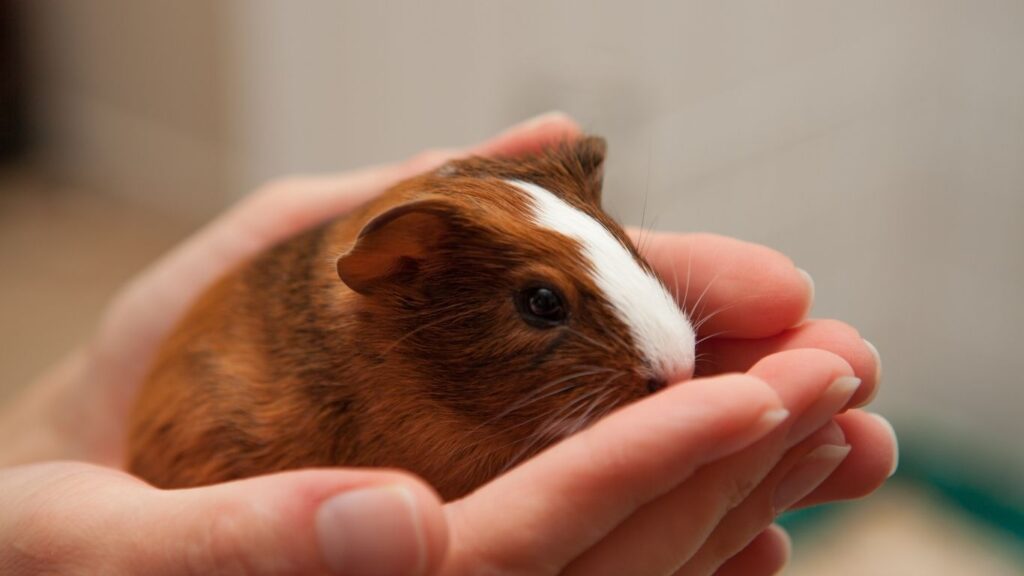
Can Guinea Pigs Be Allergic to Apples?
It is uncommon but not impossible for a guinea pig to develop an allergy or intolerance to apples. Some cavies may not digest them properly, leading to an upset stomach, bloating, or diarrhea. If this happens, stop feeding apples and reduce other fruits and veggies. Increasing timothy hay can resolve the problem quickly.
If the issue lasts over 24 hours or your guinea pig isn’t feeling well, notify a veterinarian immediately, as it could be life-threatening. To check if they tolerate apples, offer a smaller amount first. If that works better, continue moving forward with occasional servings.
Types of Apples for Guinea Pigs
Guinea pigs can enjoy a variety of apple types, but they may have flavor preferences just like humans. If your pet refuses to eat one kind, try offering different apple varieties to see which they prefer.
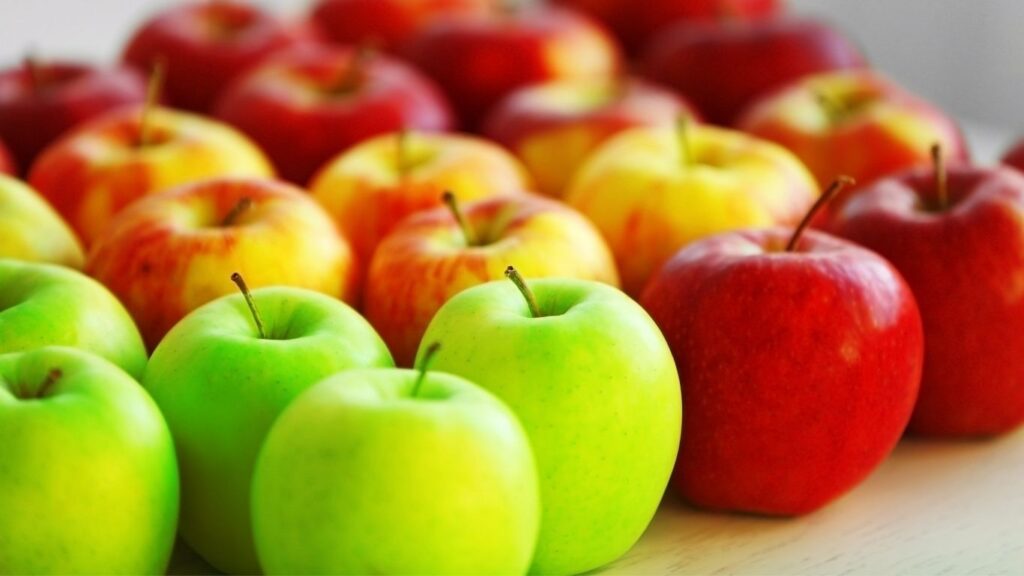
Apple Types and Their Characteristics
- Green Apples (e.g., Granny Smith) – Sour and may irritate the mouth or stomach. Best given in small amounts.
- Red Apples (e.g., Red Delicious, Fuji, Gala) – Sweeter but higher in sugar, so they should be fed occasionally as a treat.
Safe Apple Varieties for Guinea Pigs
- Braeburn
- Red Delicious
- Pink Lady
- Golden Delicious
- Granny Smith (Tart, so offer in moderation!)
- Fuji
- Gala
- Honeycrisp
Feeding Tips
- Remove all seeds before feeding, as they contain harmful compounds.
- Cut into bite-sized pieces to prevent choking.
- Limit apple intake to small portions to avoid excess sugar in their diet.
- Observe their reaction—if they dislike a variety or show discomfort, discontinue and consult a veterinarian.
Can Guinea Pigs Eat Apple Skin?
Yes, guinea pigs can eat the skin of apples, as it holds nutrients and fiber, which are helpful for digestion and regular poops. Some may prefer the taste and texture, while others might not. The peel offers health benefits since it contains fibre and a small piece is safe.
Always wash the fruit thoroughly and choose organic, unwaxed apples when possible, though they can be expensive to buy. If feeding non-organic apples, peeling is fine to remove chemicals. The nutritional value remains, as potassium is mostly located in the flesh, making it good for your piggie even when peeled.
Can Guinea Pigs Eat Apple Cores?
Guinea pigs can eat apple cores, but they shouldn’t contain seeds, which must be removed before feeding. Seeds have traces of cyanide, a chemical that is dangerous in large amounts. The fibrous core helps teeth by chomping like rough hay.
If given once or twice a week, the core is not a problem, as it provides fibre to support digestion. Most foods help wear down growing, healthy teeth. In fact, instead of throwing away leftovers, some recommend offering them occasionally.
Can Guinea Pigs Eat Cooked Apples?
Guinea pigs should not eat cooked apples because the cooking process removes nutrients and often includes added sugar, cinnamon, or nutmeg, which are unsafe for piggies. While Bramleys are sour and good for humans, they are not safe for guinea pigs.
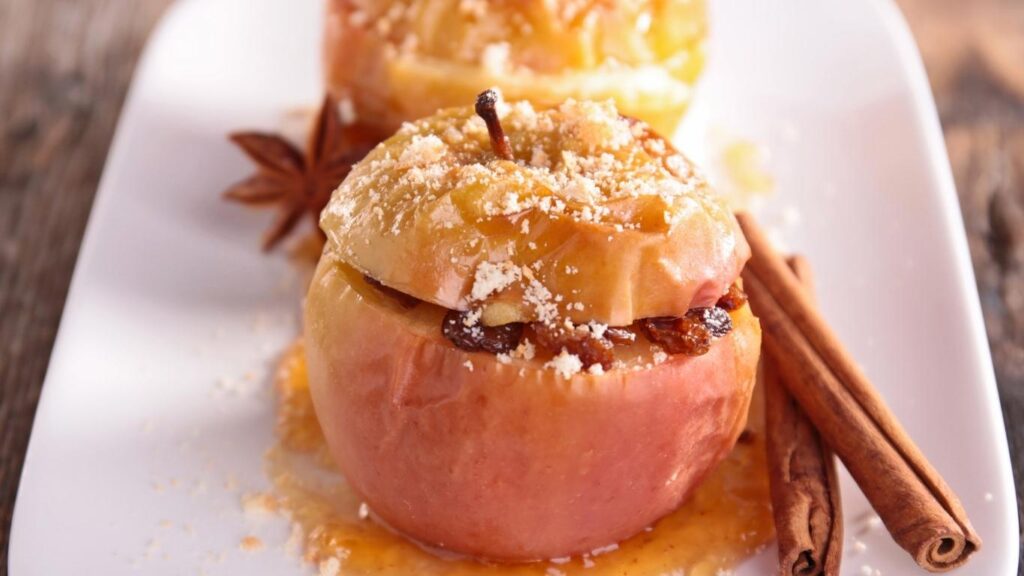
In the wild, non-domesticated guinea pigs forage for grasses, leaves, roots, and whatever food is available. They eat raw vegetables and fruit, making eating flesh, skin, and core of apples fine in small amounts. Baked or stewed apples are not nutritious and should be avoided regularly.
Can Guinea Pigs Eat Wild Apples?
Guinea pigs can eat wild apples, but their variety and taste matter. Some are tart and acidic, which may cause mouth sores if a cavy overindulges. Since trees are often untreated with pesticides, always ensure they are safe before sharing with your furred friend.
A good-sized cage can include branches for chewing, as wood from trees helps prevent stripping bark and provides exercise and mental stimulation. Leaves can be an additional snack, and chewing supports teeth health while keeping them entertained.
Can Guinea Pigs Eat Applesauce?
Applesauce is made from cooked apples with added sugar, making it too sweet and never safe for guinea pigs. This food is not a suitable addition to their diet.
Can Guinea Pigs Eat Apple Tree Leaves?
Guinea pigs can eat apple tree leaves, as they are nutritious, like the fruit, which also contains vitamins.
Can Guinea Pigs Eat Apple Sticks?
Guinea pigs love to chew apple sticks, as they help break down teeth and keep them healthy. They can also nibble on twigs, small branches, and leaves from an apple tree. When buying commercially, ensure they are fresh, nutritious, and not sprayed with pesticides or chemicals. The wood, outer bark, and inner part are tasty and safe for nibbling.
Can Guinea Pigs Eat Apple Seeds?
Guinea pigs should not eat apple seeds or pips, as they pose a choking hazard and may get stuck in their teeth. Veterinarians recommend removing them before feeding because they contain small amounts of the chemical cyanide, which is unhealthy in large quantities. Even if occasionally chewed, they can cause problems.
Can Guinea Pigs Eat Dried Apple?
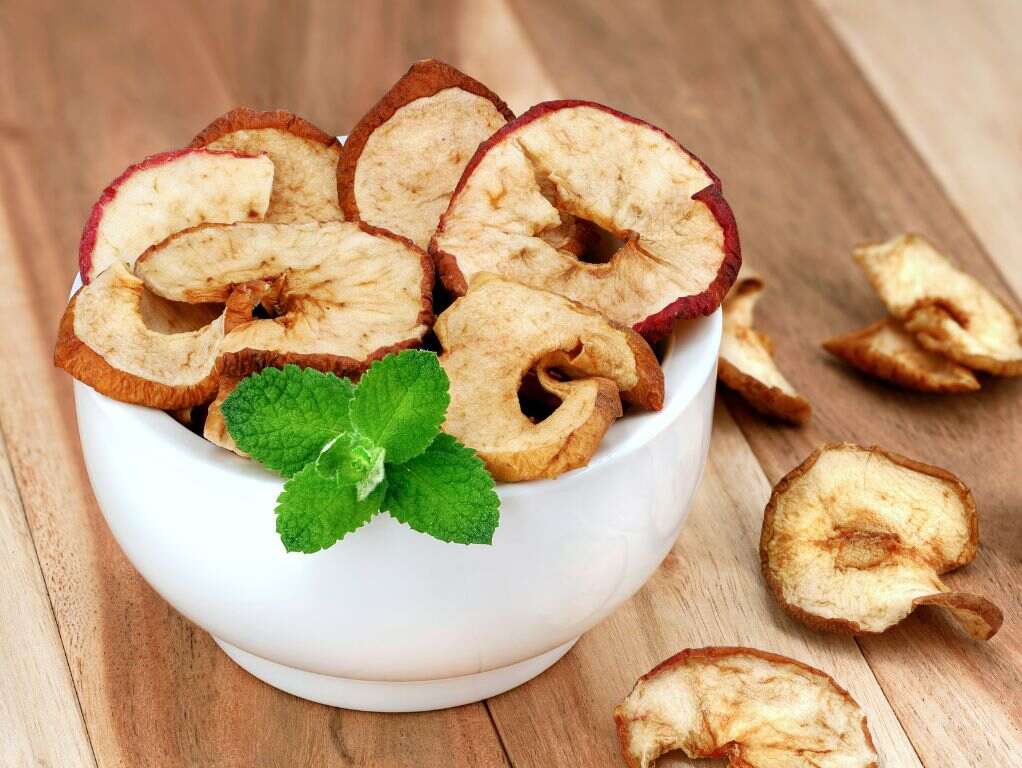
Guinea pigs can eat dried apples, but it’s best to recommend buying ones made especially for them. Small Pet Select treats are 100% natural with nothing added. A lovely option, they contain natural ingredients safe for pets.
Are Apple Seeds Poisonous to Guinea Pigs?
Yes, apple seeds are poisonous and dangerous for guinea pigs. They contain a naturally occurring chemical compound called amygdalin, which turns into cyanide when crushed, chewed, and digested. Even a minute amount can cause health issues, so avoid feeding them.
While an odd seed may not cause adverse effects, it’s best to avoid them. The core contains seeds, so removing them before offering apples as a treat prevents harm. Never feed seeds regularly, as they can expose guinea pigs to higher levels of toxins. If your pet eats one, don’t panic, but if concerned, watch for signs.
How To Safely Feed Your Guinea Pig Apples
When feeding apples to your guinea pig, always remove the core and seeds to prevent choking. Cut into bite-size pieces of the appropriate size. Avoid cooked, freeze-dried, diced, sliced, or commercially made applesauce, as these contain additional ingredients and sugar content unsafe for guinea pigs.
Apple can be offered to guinea pigs in a variety of ways, including:
- Freeze-dried
- Diced
- Sliced
- Cooked (may lower nutritional value)—do not add additional spices or ingredients
- Homemade puree (avoid commercially made applesauce due to added sugar content)
Never offer canned apples with preservatives or baked goods like muffins, cakes, stews, sauced apples, or pie filling, as these may make your piggie sick. Even dried fruits are risky because the drying process concentrates sugar, making them like candy rather than a healthy treat. Always choose fresh apples that are washed to remove pesticide exposure.
Apples can be topped with favorite salad greens like spinach, kale, carrots, celery, or watermelon for variety. Always introduce gradually to avoid stomach upset and loose stools. If they overindulge, reduce the portion and reintroduce it in a small amount later.
How Often Can Guinea Pigs Eat Apple?
Apples should be an occasional treat for guinea pigs, given once or twice a week, not every day. A variety of fresh food is important, with leafy veggies, safe foraged weeds, and vegetables making up the main daily portion instead of fruit.
How Many Apples Can a Guinea Pig Eat?
Important Points on Feeding Apples to Guinea Pigs
- Moderation is key – Apples should only be fed once or twice a week as a treat due to their high sugar content.
- Proper portion size – Offer a ½-inch bite-sized piece to prevent choking and digestive issues.
- Remove seeds and core – Apple seeds contain cyanide, which is dangerous for guinea pigs. Always remove them before feeding.
- Whole apples are unsafe – Whole, half, or large mouthfuls can lead to diarrhea, dental problems, and long-term diseases like diabetes.
- Diarrhea risk – Overfeeding apples can cause diarrhea, leading to dehydration, weakness, and stomach pain. If diarrhea lasts more than 48 hours, see a veterinarian as soon as possible.
- Fresh is best – Avoid cooked, dried, canned, or frozen apples, as they contain added sugar and preservatives that are unhealthy for guinea pigs.
- Monitor for side effects – Watch for stomach upset, bloating, or GI pain. If symptoms last over 48 hours, seek medical advice.
- Balance their diet – A ½-cup per day of timothy hay, grasses, and vegetables is essential for a healthy diet.
- Avoid overindulgence – Overfeeding apples can lead to weight gain, obesity, grooming issues, coat problems, infections, and parasites like Cheyletiella.
- First-time feeding – If it’s the first time introducing apples, start with a tiny piece and observe their reaction.
- Discard uneaten apples – Remove any uneaten slices after 24 hours to prevent spoilage.
- No unsafe human foods – Guinea pigs cannot eat baked goods, sushi, or processed fruit-based foods like muffins, cakes, stews, or applesauce.
Do Guinea Pigs Like Apples?
Guinea pigs usually love apples, but some can be fussy about food. Just like humans, they have likes and dislikes. In a poll, 80% of owners said yes, while 20% said no—most enjoy them, but a few don’t.
Do Apples Cause Sore Mouths in Guinea Pigs?

Eating too much apple can cause mouth soreness due to its acidity, which may aggravate the issue. Bacteria or fungi can also result from frequent fruit consumption. To eliminate the problem, reduce or completely remove apples from their diet if needed.
Nutritional Information for Apples
The nutritional value of a 100g apple includes vitamin C (4.6 mg), calcium (6 mg), phosphorous (11 mg), fibre (2.4 g), and sugar (10 g). Guinea pigs should eat this fruit every week, not daily.
A printable PDF download of a meal planner helps organize a variety of foods, including vegetables. The best fresh food options should be balanced properly. Color-coded charts can assist in planning safe meals.
What Other Fruits Can Guinea Pigs Eat?
Safe Fruits and Vegetables for Guinea Pigs
A balanced diet for guinea pigs includes fresh hay, vegetables, and pelleted foods, with fruits offered occasionally as treats. Owners should provide a variety of safe options in moderation, ensuring that seeds are removed and pieces are bite-sized and appropriate for their size.
Guinea Pigs’ Natural Diet and Digestive Sensitivity
In the wild, guinea pigs are herbivores, mainly consuming vegetable matter found in South American forests, such as grasses and fiber-rich foods. Since apples contain sugar and carbs, feeding large amounts is not recommended. Their digestive system is sensitive and not designed to handle heavy loads of sugar, carbs, or even excessive pelleted guinea pig foods.
To avoid digestive issues, introduce new fruits and vegetables slowly over several weeks and limit their intake to ½-cup per day. Feeding larger quantities may lead to diarrhea, bloating, or loss of appetite.
Safe Fruits for Guinea Pigs (Fed in Moderation)
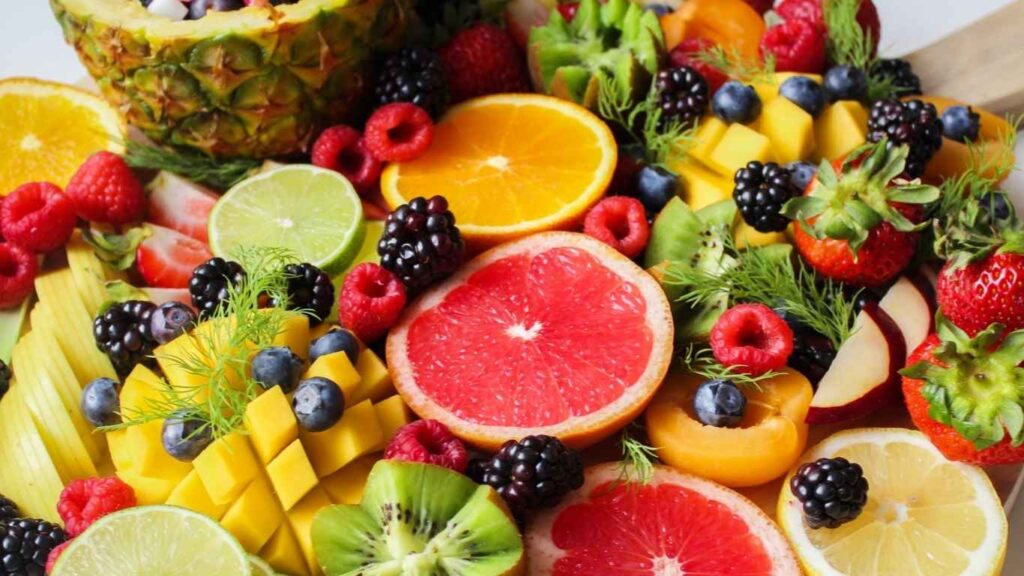
- Blueberries
- Strawberries
- Grapes (Seedless only!)
- Pears
- Melons (Watermelon, Honeydew, Cantaloupe)
- Mangos
- Kiwis
- Citrus Fruits (like Oranges) – Caution! These contain acidic properties that can irritate your guinea pig’s mouth and digestive tract if overfed.
Nutritious Vegetables for Guinea Pigs
- Green Pepper (Rich in vitamin C!)
- Pumpkin
- Tomato (Feed in small amounts, avoid stems and leaves!)
- Squash
- Broccoli (High in fiber, but can cause gas in excess!)
- Cauliflower (Offer in moderation due to bloating risk!)
- Endive
Leafy Greens for a Healthy Diet
- Carrot tops
- Beet greens
- Romaine lettuce
- Kale
- Red and green leaf lettuce
- Asparagus
- Zucchini
- Cilantro
Important Feeding Tips
- Introduce new foods gradually to prevent digestive discomfort.
- If your guinea pig develops diarrhea, bloating, or loses appetite, stop feeding the new food immediately and contact a vet.
- Avoid large amounts of citrus fruits like oranges, as their acidic nature can irritate the mouth and digestive system.
- Ensure constant exposure to fresh hay to support healthy digestion.
Conclusion
Can Guinea Pigs Eat Apples? 🍏🐹
Yes, guinea pigs can eat apples as an occasional treat! Apples provide vitamin C, fiber, and hydration, but due to their high sugar content, they should only be fed in moderation to prevent digestive issues.
How to Feed Apples Safely
✅ Portion size – A ½-inch cube twice a week is ideal.
✅ Remove seeds – They contain cyanide and are toxic.
✅ Wash thoroughly – To remove pesticides.
✅ Introduce slowly – Start with a small bite and observe for any reactions.
Types of Apples for Guinea Pigs 🍎
Guinea pigs may have flavor preferences, so try different varieties:
✔ Sweet & Mild – Fuji, Gala, Red Delicious
✔ Tart & Acidic – Granny Smith, Braeburn (feed in smaller portions)
Potential Risks of Overfeeding Apples 🚨
⚠ Diarrhea & Digestive Upset – High sugar can cause bloating.
⚠ Weight Gain & Obesity – Excess sugar leads to unhealthy weight gain.
⚠ Sore Mouth – Acidic apples may irritate the mouth of sensitive guinea pigs.
Tip: If your guinea pig experiences discomfort, stop feeding apples and increase hay intake for gut regulation.
Alternative Healthy Treats for Guinea Pigs 🍓
🔹 Safe Fruits (in moderation) – Blueberries, strawberries, pears, watermelon, kiwi.
🔹 Nutritious Veggies – Bell peppers (rich in vitamin C!), carrots, broccoli (in small amounts), zucchini.
🔹 Leafy Greens – Romaine lettuce, cilantro, kale, carrot tops.
🐹💚 Apples are a delicious, healthy snack for guinea pigs when fed in moderation. Always prioritize hay, fresh vegetables, and vitamin C-rich foods for a balanced, happy piggy!
Kindly note: The content shared in this blog is gathered from online sources, some of which may not be verified. For accurate guidance on caring for your guinea pig, it is recommended to seek advice from a qualified veterinarian.

